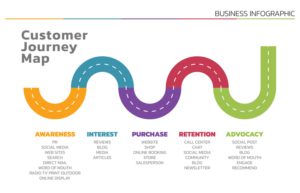
Why Customer Experience Is the New Marketing Strategy
In today’s saturated market, traditional marketing methods are no longer enough to capture and retain customer attention. Modern consumers expect more than catchy slogans or one-size-fits-all campaigns—they crave personalized, seamless, and memorable experiences across every touchpoint. That’s why forward-thinking brands are shifting their focus from messaging to experience. In other words: customer experience (CX) has become the new marketing strategy.
Consumers today are more empowered than ever. With instant access to information, reviews, and competitive options, they expect brands to understand their needs and anticipate their preferences. A disconnected or generic interaction can quickly send them elsewhere. As a result, companies must think beyond individual campaigns and consider how every interaction contributes to the overall brand perception.
This shift requires a strategic mindset—one that integrates marketing, technology, service, and operations into a cohesive experience. At Stevens & Tate, this holistic approach is central to building marketing strategies that don’t just attract attention, but sustain engagement and loyalty over time.
From Product to Experience
Not long ago, marketing was primarily about showcasing product features and outshouting the competition. But as Oracle explains, customer experience encompasses every interaction a consumer has with a brand—before, during, and after a purchase. It’s not just about making a sale; it’s about creating value at every step of the journey. (Oracle, What is CX?)

Today, that journey is rarely linear. Customers may discover a brand through social media, research on a mobile device, compare options online, and complete a purchase in-store—or vice versa. Each touchpoint shapes expectations and influences decision-making. Brands that focus solely on product messaging risk overlooking the broader journey that ultimately determines loyalty.
This shift is especially critical in industries where competitors offer similar products or services. In such cases, CX becomes a key differentiator. A faster checkout process, a helpful chatbot, or a personalized follow-up email can be the reason a customer returns—or walks away.
Beyond convenience, emotional resonance plays a powerful role. Customers remember how easy an experience felt, how quickly their concerns were addressed, and whether a brand demonstrated genuine understanding. Stevens & Tate works with brands to align creative storytelling with operational excellence—ensuring that the promise made in marketing is consistently delivered in practice.
When experience becomes the priority, marketing evolves from a promotional function into a relationship-building engine.
Why CX Drives Growth
Customer experience isn’t just about delight—it’s about driving measurable business results. According to the Forbes Communications Council, brands that embed CX into their marketing strategies see improved customer loyalty, increased retention, and stronger word-of-mouth. With customer acquisition costs rising, those outcomes are more important than ever.
A seamless experience reduces friction, shortens sales cycles, and increases conversion rates. It encourages repeat purchases and strengthens brand trust. Over time, these improvements compound—resulting in stronger lifetime value and more predictable revenue streams.
In fact, satisfied customers are 5x more likely to repurchase and 4x more likely to refer a friend. A well-crafted experience not only retains customers but also turns them into advocates, amplifying your marketing efforts organically.
Retention has become one of the most valuable growth drivers in modern marketing. Acquiring new customers requires significant investment, but nurturing existing relationships delivers sustained returns. By embedding CX into strategy and execution, agencies like Stevens & Tate help brands connect performance metrics directly to customer satisfaction and loyalty outcomes.
Strong CX also builds resilience. In competitive markets or uncertain economic conditions, brands that consistently deliver value and reliability maintain customer trust—an asset that cannot be easily replicated by competitors.
Integrating CX Into Your Marketing Strategy
To effectively make CX the backbone of your marketing, consider the following steps:
- Map the Customer Journey: Understand your audience’s experience from the first touchpoint to post-purchase interactions. Identify pain points and opportunities to improve.
- Use Data to Personalize: Leverage customer data to tailor messages, content, and offers. Personalization creates relevance, and relevance builds trust.
- Break Down Silos: Align marketing with customer service, sales, and operations. A seamless experience requires internal collaboration.
- Listen and Adapt: Use customer feedback to refine messaging and improve products or services. CX is not static—it evolves with expectations.
By combining strategy, creativity, and data-driven insights, Stevens & Tate helps organizations transform CX from an abstract concept into a measurable, scalable growth framework.
Read More: How to Create Cohesive Customer Jouneys
CX Is the Future of Marketing
Customer experience isn’t a buzzword or a trend—it’s a strategic imperative. As brands strive to stay relevant and competitive, those that prioritize CX will be the ones that thrive. In a world where consumers have endless choices, the experience you deliver might just be your most powerful marketing asset.
As expectations continue to rise, the brands that succeed will be those that treat every interaction as an opportunity to build trust. Experience-led marketing fosters deeper relationships, stronger advocacy, and sustainable growth.
Ultimately, marketing is no longer just about communicating value—it’s about consistently delivering it. When CX becomes central to strategy, organizations move beyond transactional thinking and toward long-term relationship building. With the right expertise and integrated approach, brands can turn customer experience into their most meaningful competitive advantage.
Read More: How to Create A Seamless, Omnichannel CX




























 Mastering inbound marketing requires a strategic approach to attract, engage, and convert customers. From SEO optimization and content creation to email marketing and influencer collaborations, each tactic plays a crucial role in driving organic growth. Leveraging interactive content, social media engagement, and continuous performance analysis ensures your marketing efforts remain effective. By implementing these ten strategies, businesses can build strong customer relationships and increase brand visibility.
Mastering inbound marketing requires a strategic approach to attract, engage, and convert customers. From SEO optimization and content creation to email marketing and influencer collaborations, each tactic plays a crucial role in driving organic growth. Leveraging interactive content, social media engagement, and continuous performance analysis ensures your marketing efforts remain effective. By implementing these ten strategies, businesses can build strong customer relationships and increase brand visibility. 


